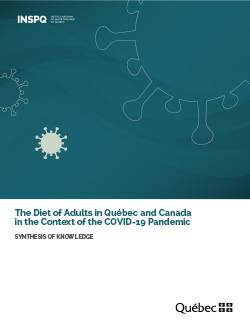The Diet of Adults in Québec and Canada in the Context of the COVID-19 Pandemic
This synthesis of data aims to inform decision-makers and stakeholders about changes in the diets of adults in Québec and Canada during the pandemic and to guide subsequent work to promote healthy eating in the current context and for years to come. For around half the themes examined, the data was insufficient to draw conclusions. For the other half of the themes identified, while the data represent self-reported perceptions of change and are based on small non-probability and/or non-representative samples, some conclusions could be drawn.
The available data suggest that some adults in Québec and Canada changed their food intake and eating habits, while others maintained theirs, during the first year of the pandemic. Certain changes promoted health while others adversely affected it:
- While 10%–25% of respondents indicated that they were eating more fruits and vegetables, around 10%–20% indicated that they were eating less. The majority (65%–70%) reported consuming the same amount. The proportion of adults who increased their consumption of fruits and vegetables is larger than the proportion who lessened theirs in all studies reporting these two proportions.
- Half of the respondents indicated having maintained their consumption of junk food during the pandemic. The other half reported either increasing (20%–35%) or reducing (15%–25%) theirs.
- While 20%–75% of respondents reported meal planning and cooking more often, less than 15% reported cooking less often, and 25%–70% cooking as often as before the pandemic.
- Overall, in all studies on the habit of snacking, the proportion of respondents who indicated snacking more was greater (10%–40%) than those who snacked less during the pandemic (5% 20%).
It appears that proportionally more young adults changed various parameters of their diet compared to older adults. In general, a greater proportion of older adults than young adults reported having a similar diet to before the pandemic:
- A greater proportion of young adults (43%–48%) than older adults (2%–36%) indicated consuming more junk food than before the pandemic. The proportion of young adults who reported a reduction in their consumption of junk food (12%–17%) appears to be slightly lower than that of older adults (14%–29%). In all surveys, more young adults reported having increased their consumption of junk food than reported having reduced it (43%–48% vs. 12%–17%).
- Young adults are proportionally the largest age group who cooked more before the pandemic.
Due to insufficient data, it was not possible to determine whether the nutrition inequities present before the pandemic were exacerbated during the pandemic. Considering the increase in food insecurity, a condition that is inversely associated with diet quality, it would be pertinent to validate the hypothesis that pre-existing differences have been aggravated during the pandemic.
The limitations of the data derived from rapid dietary assessment during the pandemic, such as those presented in the studies examined, demonstrate the importance of developing a monitoring system for Quebecers’ diets using frequent representative population surveys that use validated methods for collecting data on food intake.
It is crucial to continue actions that aim to maintain and develop healthy diets and improve the quality of food environments. These interventions must specifically benefit individuals affected by the nutrition inequities present before the pandemic as well as young adults. New initiatives could be implemented, especially if the hypothesis that nutrition inequities were exacerbated during the pandemic is confirmed by new data


